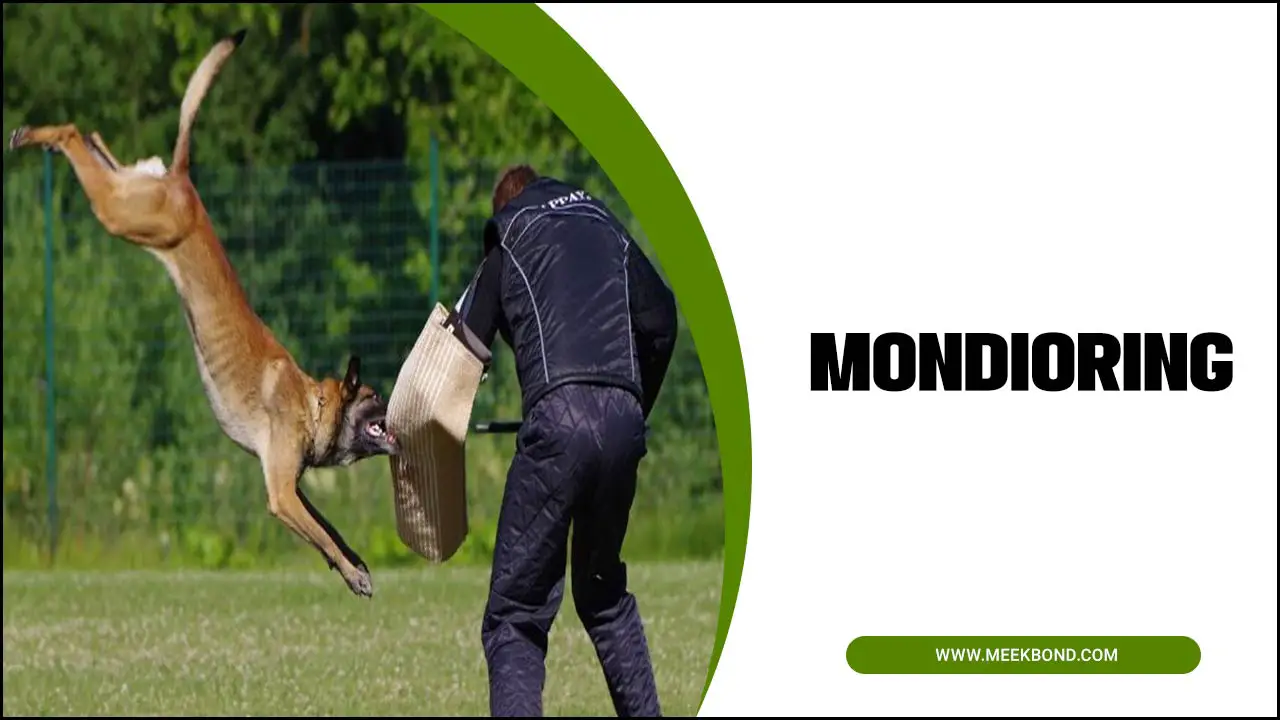Service dogs are dogs that have specific training to help people with disabilities. They play an important role in the lives of their handler. They can provide tremendous assistance in many areas, including helping to mitigate the effects of disabilities such as blindness, paralysis, autism, and seizure disorders.
This guide will discuss the types of service dogs, the laws surrounding service dogs, and how to get one if you need one. So read on to learn everything you need to know about service dogs.
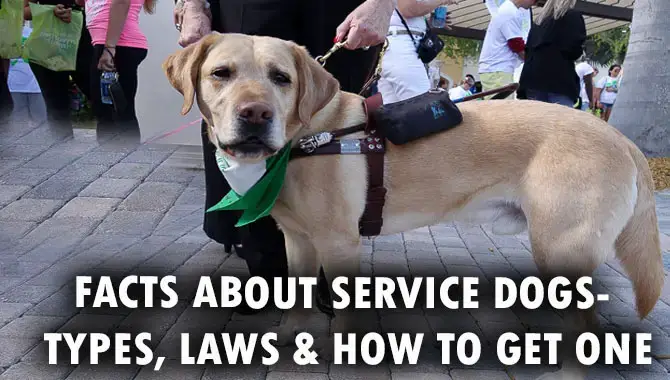
What Are Service Dogs?
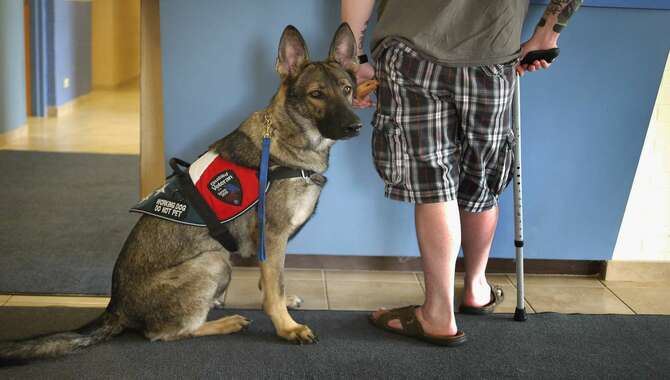
A service dog is a trained animal that helps people with disabilities. We often use them to help people with epilepsy, autism, and PTSD. Service dogs can open doors, retrieve objects, or assist in toileting. Service dogs have specific training designed to help them provide their customer with the best possible assistance. In most cases, they require certification from the organization they work for.
You should be aware of a few laws related to service dogs. For example, all service dogs must be on a leash when they’re not in use, and you must keep them under control at all times. They cannot interfere with the normal operations of businesses, and they cannot alarm or startle people unnecessarily.
Service Dogs In Places Of Business
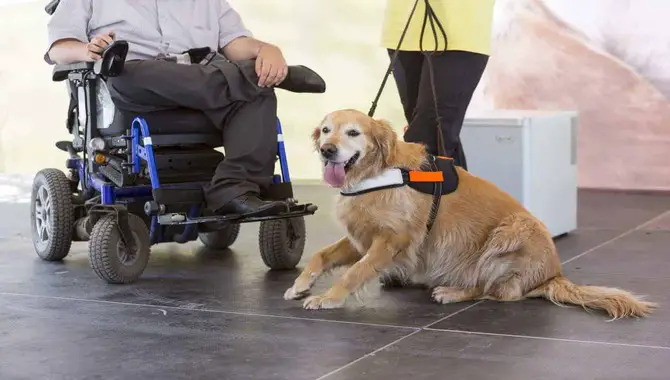
Service dogs have special training to help people with disabilities. They can be in places of business with the proper paperwork. And we must treat as such – never petted, licked, or otherwise interacted with. There are different service dogs – Guide Dogs, Psychiatric Service Dogs, Emotional Support Dogs etcetera.
Each has its specific purpose and helps a person with a disability in some way cope with their situation to a much greater extent than would be possible without one.
Service Dogs In Schools

Service Dogs have no bound in public places, such as schools and hospitals where they legally can be. These Dogs must have a valid identification card and registration with their service dog handler(s). We should not mistake them for pets.
They have specific job duties that differ from person to person. Some of the most common tasks service dogs include helping people who suffer from anxiety or PTSD by detecting emotional cues in the environment, helping individuals with mobility issues navigate crowded areas, or providing support during physical therapy sessions.
Types Of Service Dogs
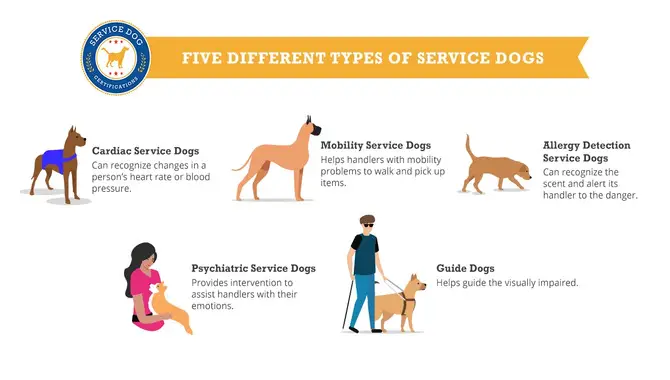
If you’re someone with disabilities, you know the importance of having a service dog. Service dogs provide invaluable support, helping people with disabilities live more independently and enjoy the same basic rights and freedoms as everyone else.
There are several different types of service dogs, all of which have different training requirements and abilities. If you’ve interest in getting a service dog, speak with your doctor first. And ensure it’s the right type for you. Also, be aware to protect the service dogs under the law in most jurisdictions.
So you shouldn’t worry about discrimination or harassment. In the end, it’s important to know the facts about service dogs to make an informed decision and get the support you need to live a fuller life.
1.Allergy Detection Dogs

If you or someone you know is living with allergies, allergy-detection dogs could be the perfect solution. These specially trained dogs help people detect allergens in their environment and live without fear of allergic reactions. There are many different types of service dogs.
Each suited to a specific disability like vision impairment, mobility assistance, seizure support, etc. ADI offers an online application process that makes applying for a service dog easy and accessible from anywhere in the world.
2. Autism Service Dogs
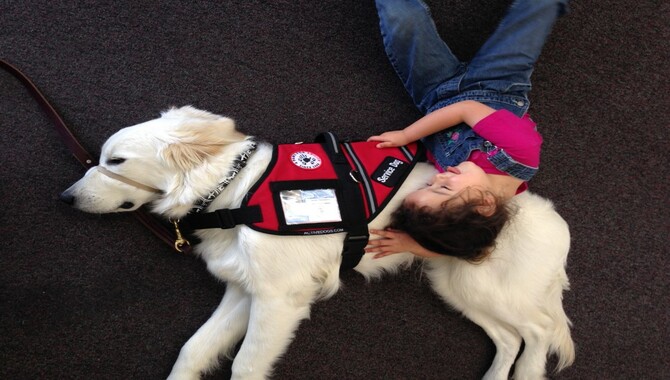
Autism service dogs are special dogs who have special training to help people with autism in various ways. They can provide comfort, support, and communication, among other things. These amazing animals deserve our attention and support as they play a very important role in the lives of people with autism.
3. Diabetic Alert Dogs
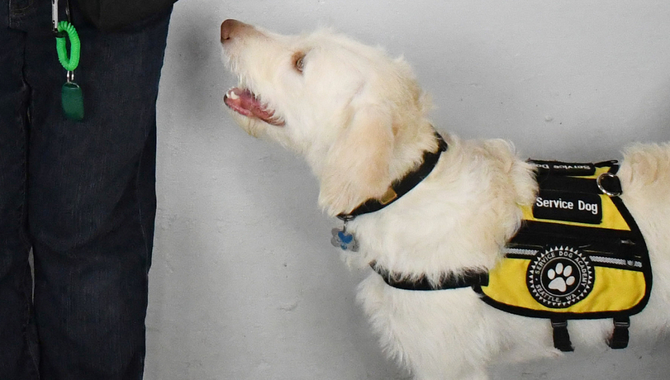
There are many different service dogs, and each have special training to help a person with a disability. Diabetic alert dogs, in particular, are very useful for people with diabetes as they provide alerts if their blood sugar levels exceed specific thresholds. This can help them live a normal life by helping them avoid complications that may arise from high blood sugar levels. If you need assistance from dog support:
Then get one from an accredited organization like Assistance Dogs Australia Inc. These organizations have access to the best training facilities and handler teams, which ensure that the service dog can assist its owner in fulfilling their day-to-day tasks efficiently and effectively.
4. Guide Dogs
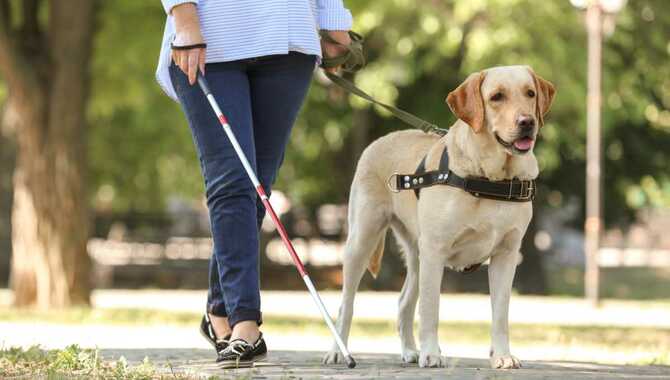
Guide Dogs are the most common type of service dog that people with visual impairments use. They act as companions to help people who have difficulty mobility or navigating independently in their environments.
Hearing dogs detect sounds and psychiatric service dogs help people with mental illnesses. All service dog requires training by law in the United States and Canada. So that these animals can serve many different purposes in the future.
5. Hearing Dogs
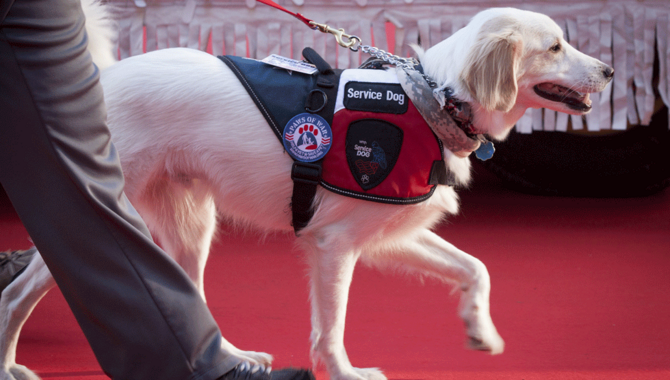
Hearing dogs are a wonderful aid for people who have disabilities. Anyone can use different types of service dogs, regardless of their disability. Service dog users don’t have to worry about harassment or discrimination in public places like restaurants and stores.
They must also carry an identification card and registration with the ADA (Americans with Disabilities Act). All these make service dogs one of the most important support systems for those with disabilities.
6. Mobility Assistance Dogs
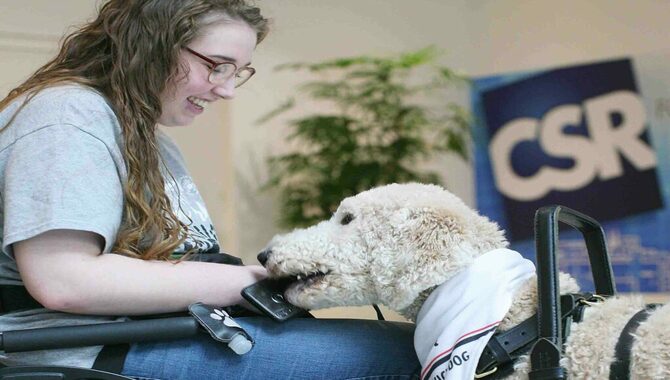
If you plan on traveling anytime soon, you should consider getting a mobility assistance dog. These dogs come in different shapes and sizes, but they all have one thing in common – the ability to help people with disabilities live more comfortable lives. There are several types of service dogs – emotional support animals (ESA), psychiatric service animals (PSA), and more.
7. Psychiatric Service Dogs
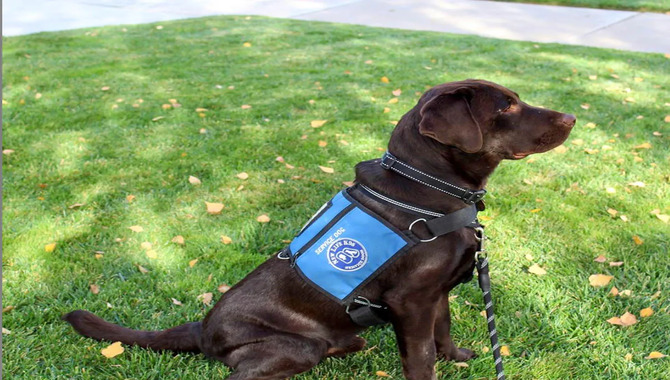
There are many different service dogs, each with a specific purpose. Psychiatric service dogs have special training to help people with mental health issues. To get a psychiatric service dog, you will need a letter from your doctor confirming that you have a diagnosed mental illness and that the dog can provide assistance following the standards of the American Psychiatric Association (APA). You must vet the dog fully and certify as seizure-free and up-to-date on all vaccines.
8. Seizure Alert Dogs
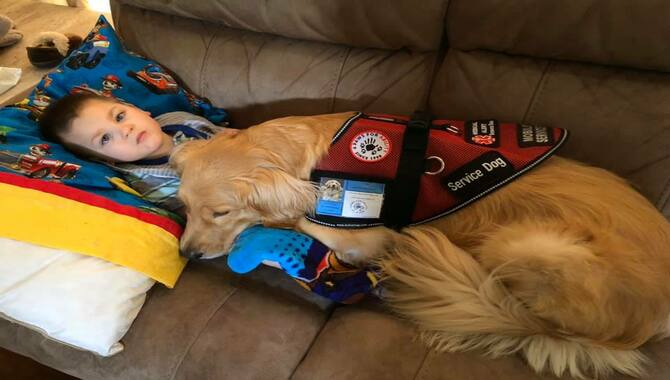
Seizure-alert dogs have special training to be service dogs that help people with disabilities. They provide support during a seizure, which can be life-saving for those who suffer from them. There are many types of seizure-alert dogs, each designed to meet the specific needs of different individuals.
If you or someone you know is living with a disability and requires assistance from a service dog, several resources are available to support you in your search.
How To Get A Service Dog
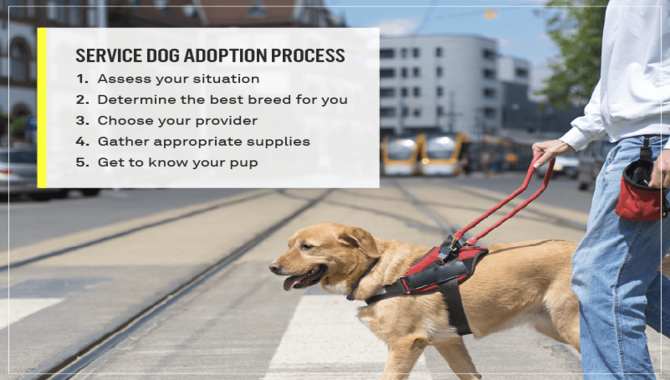
A service dog can change the life of those who need it the most. They have special training to help people with disabilities, such as autism or cerebral palsy and their handlers. There is a long list of conditions service dogs can help with, including but not limited to:
retrieving objects, opening doors, pulling levers, providing balance and stability, and tracking down specific items. Getting a service dog can be difficult – but it’s worth it. If you’re considering getting one for yourself or someone you love, here are some tips on how to go about it:
- Research reputable organizations that conduct training programs for service dogs.
- Talk to friends and family members who may have experience with service animals and ask for their advice.
- Visit an animal shelter or rescue organization to meet different types of service dogs and find the one that is perfect for you.
- Obtain dog training documentation from your service animal handler detailing the dog’s specific training skills.
- If you are traveling with your service dog, register with state agencies that oversee service animals, such as the Department of Justice (DOJ) in California or the United States Customs and Border Protection (CBP).
- Purchase insurance to cover disability claims made by others due to an attack or injury by your service animal.
- Document all services provided by your service dog daily, including where they were when served, what task they employed the dog to perform, and achieve results.
- Carry documentation of your service animal’s training with you at all times in case law disputes arise.
Qualifying For A Pet

The dog must be individually certified by a specialized organization to qualify for a service dog. You don’t need any special certification or permission from the government to get a service animal – all you need is proof that your disability requires the assistance of a service dog.
Service dogs can bring immense happiness and comfort to their handler and can be an invaluable support in many areas of life. If you are considering getting a service dog, consult with an organization that can certify your dog and provides you with helpful information and support.
Which Breeds Can Be Service Dogs?
Many breeds of service dogs we can use as assistance dogs. The most common breeds are German Shepherds, golden retrievers, Labrador Retrievers, and Boxers. Though any breed can become a service dog if trained and certified, some breeds are more likely to be successful than others. For example, German Shepherds are natural working dogs bred for centuries to serve people in various capacities.
Here Are Some Facts About Service Dogs
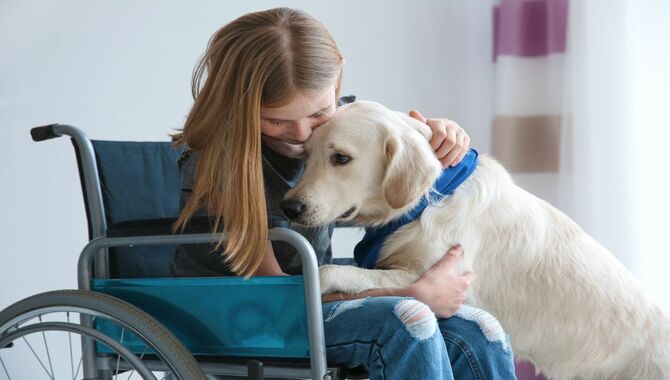
- All service dog applicants must undergo a thorough evaluation to ensure they are the right fit for the job.
- There are strict laws governing who is eligible to have a service dog, so be sure you understand them before applying.
- Service dogs can come in many different breeds, including golden retrievers, Labradors, border collies, and German shepherds.
- All service dog applicants must have training and certification to be effective.
- Service dogs are not cheap.
- They typically cost around $3,000.
Can A Service Dog Be Off-Leash?
For those of you who are unfamiliar with service dogs, they are dogs that have special training to help people with disabilities. These dogs have undergone rigorous training and are specially selected for their handler’s needs. As a service dog handler, you are granted certain rights and privileges that other citizens don’t have. One of the rights you have is the right to have your service dog off-leash. This is legal as long as the dog is under the handler’s control at all times.
Additionally, service dogs are legally allowed in public places such as stores, restaurants, and airplanes. The law doesn’t differentiate between service animals and emotional support animals, so you can be sure that your animal is qualified to work therapeutically with you. There are several organizations that certify service dogs, so you can be sure that your animal is of the highest quality and meets all the requirements for certification.
Importance Of Service Dogs
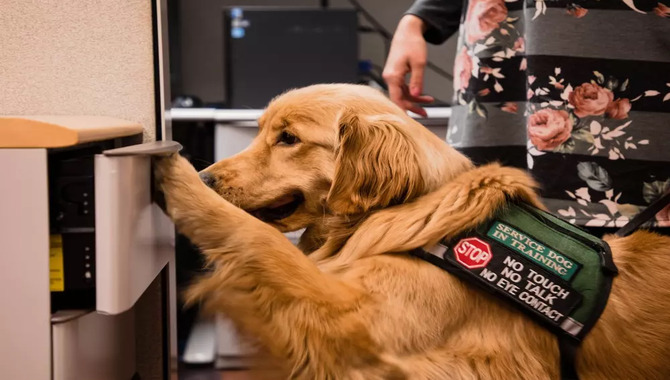
If you’re someone who is living with a disability, you know the importance of service dogs. These animals have special training to help people with disabilities live more independent lives. That’s why it’s so important to know what a service dog is, what they do, and the laws surrounding them. A service dog is any dog that is individually trained to do work or perform tasks for the following:
- the benefit of an individual with a disability,
- including guiding individuals who are blind, alerting individuals with hearing impairments to sounds outside,
- pulling a wheelchair,
- carrying groceries,
- filling prescriptions,
- and providing mental preparation for imminent emergencies.
Anyone can petition for permission to adopt a service dog – there is no income or residence requirement involved. In order to ensure that service dogs are properly immunized and dewormed, all service dogs must be properly vaccinated and dewormed against different diseases so they don’t spread germs while working.
Conclusion
Did you know that service dogs can help people with disabilities live more independently? In this blog, we will discuss the different types of service dogs, the laws surrounding service dogs, as well as how to get a service dog. We hope that this blog was helpful and that you will consider getting a service dog for yourself or a loved one. Thank you for reading.
Frequently Asked Questions
Can Any Dog Be A Service Dog?
Any dog can be a service dog, as service dogs are specifically trained to help individuals with disabilities. There are many different service dog organizations and training programs that provide service dogs to people in need all across the United States. Service dog certification is nationally recognized, and service dogs must pass a nationally recognized evaluation process and meet specific physical, sensory, and mental requirements.
What Dogs Are Banned From Being Service Dogs?
Service dogs are bred for specific purposes, such as law enforcement, guide dog, narcotics detectors, or support animal. There are a number of dogs that are commonly seen as service dogs, but they’re only sometimes allowed in public places like restaurants or theaters.
Can A Service Dog Be Allowed To Be Aggressive?
No, service dogs are not allowed to be aggressive in any way. This means that the dog cannot attack or intimidate anyone, even if the person attacking the dog does not know that the dog is a service animal. The person who owns the dog must have a disability and require the assistance of the dog for their daily activities.
Can You Ask Someone If Their Dog Is A Service Dog?
Yes, you can ask someone whether their dog is a service dog. However, before you do so, it’s important to know the two types of service dogs. Service dogs must be good at performing specific tasks, like pulling a wheelchair or fetching dropped objects.
How Do I Get A Service Dog?
Before you can get a service dog, you must first have an approved disability. There are many different types of service dogs, and each one is specifically trained for a certain task or condition.
For example, service dogs that are used to help people with PTSD (post-traumatic stress disorder) or mobility disabilities might be trained in tasks like calming the person down, leading them to safety, or getting them food.

Aquarium passion is all about connecting with the aquatic life and providing education to the public on the importance of these creatures. We showcase a wide variety of marine life through our exhibits as well as working with schools to provide unique learning opportunities for students of all ages.


